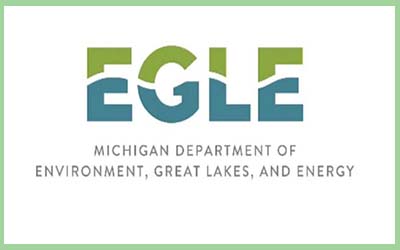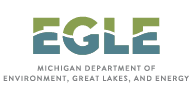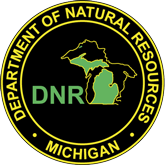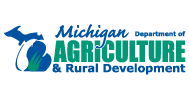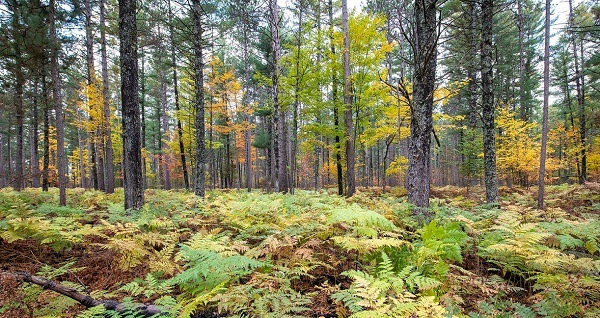 Aug. 25, 2021 Aug. 25, 2021
Contact: Scott Whitcomb (DNR), 231-373-3007 or Anne Santori (DTE Energy),
313-235-5555
DNR, DTE Energy finalize agreement on nation’s first carbon-credits project on state forest land
Michigan’s 3.9 million acres of state forest land provide space for outdoor recreation, cleaner water, habitat for wildlife and many other benefits. Thanks to a recent agreement between the Michigan Department of Natural Resources and DTE Energy, Michigan’s largest energy company, part of that forest land now will yield carbon credits that will help DTE reduce its carbon footprint and add an estimated $10 million in revenue to natural resource management.
The Bluesource/Michigan DNR Big Wild Forest Carbon Project is the first of its kind in the nation to leverage the carbon storage capacity of trees in state forests. The pilot project offers a portfolio of carbon offset credits generated from sustainable forest management activities on more than 100,000 acres of the celebrated Pigeon River Country State Forest – known as “The Big Wild” – in the northern Lower Peninsula.
“Our natural resources are a core aspect of our identity as Michiganders,” said Gov. Gretchen Whitmer. “To meet our long-term commitment to decarbonization we need to utilize innovative partnerships to increase revenues for land and climate programs. Under today’s program, we are pursuing a climate-smart forestry strategy and effectively utilizing our natural and working lands to decrease pollution and protect public lands.”
The pilot project
 A single tree can absorb as much as 48 pounds of carbon dioxide in a year. By the time a tree is 40 years old, it can store 1 ton of carbon. If these trees are then used to make long-lasting wood products, the carbon they absorbed from the atmosphere is captured or “stored” within the manufactured furniture, houses or countless other items. A single tree can absorb as much as 48 pounds of carbon dioxide in a year. By the time a tree is 40 years old, it can store 1 ton of carbon. If these trees are then used to make long-lasting wood products, the carbon they absorbed from the atmosphere is captured or “stored” within the manufactured furniture, houses or countless other items.
One carbon credit equals 1 ton of carbon dioxide emission. Studies show carbon capture (sequestration) could contribute up to 30% of the global effort to reduce carbon in the atmosphere. DTE Energy will offer these offsets to their larger industrial natural gas clients seeking to reduce the impact of carbon emissions, much as they do for their residential and small business customers through DTE’s voluntary Natural Gas Balance program.
DTE Energy has agreed to buy all of the carbon credits generated off the Pigeon River Country State Forest during the first 10 years of the program, at an estimated cost of more than $10 million. Payments (to the state) will start with the first delivery of carbon credits to DTE in 2022. Bluesource, the company managing the DNR’s pilot carbon credit marketing project, will provide updates on the revenue stream’s timeline and size.
The purchase of carbon credits allows DTE to offer carbon offsets to customers with significantly higher energy usage, a move that also aligns with DTE’s goal of achieving net zero carbon emissions by 2050.
“We’re proud to partner with the DNR on this innovative way to help Michigan get cleaner, faster,” said Matt Paul, president and chief operating officer at DTE Gas. “These offsets will be made available to our customers that are seeking impactful ways to reduce their carbon footprint and join DTE on its journey to net zero greenhouse gas emissions by 2050. The Pigeon River Country State Forest project is an excellent complement to the 24,000 acres of Michigan forest we are already protecting through Natural Gas Balance, our voluntary program that helps residential and small business gas customers reduce their carbon footprint.” |
Support for forests, wildlife
 Beyond the air-quality benefits – Michigan’s forests can substantially reduce the amount of carbon dioxide that has been released to the environment, which cuts air pollution and helps mitigate the effects of climate change – the carbon-credits project will allow the DNR to credit crucial dollars to funding sources that support the Pigeon River Country State Forest. Beyond the air-quality benefits – Michigan’s forests can substantially reduce the amount of carbon dioxide that has been released to the environment, which cuts air pollution and helps mitigate the effects of climate change – the carbon-credits project will allow the DNR to credit crucial dollars to funding sources that support the Pigeon River Country State Forest.
Revenue generated from these carbon credit purchases will be directed to the state’s Forest Development Fund and the Fish and Game Fund for efforts that could include tree planting, forest infrastructure (such as roads, bridges and culverts), wildlife habitat improvements, recreation projects and more.
The environmental benefit of the project stems from the state’s ongoing commitment to sustainable forest management, while ensuring more trees will stay in place long term to enhance the carbon sequestration of the Pigeon River forest.
“We manage Michigan’s state forests with a firm commitment to the health and sustainability of this incredible resource, as well as to the people who enjoy the forests and the fish and wildlife that rely on them,” said Michigan Department of Natural Resources Director Dan Eichinger. “We’re excited to see this thoughtfully leveraged use of our state’s diverse forest land result in a program that works on so many levels.” |
Getting started
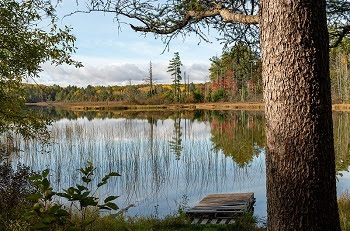 Bluesource, the company selected last fall to manage the DNR’s carbon credits development and marketing program, is a Salt Lake City firm that has pioneered creative solutions to climate risk since 2001. Bluesource, the company selected last fall to manage the DNR’s carbon credits development and marketing program, is a Salt Lake City firm that has pioneered creative solutions to climate risk since 2001.
“Bluesource projects have reduced hundreds of millions of tons of greenhouse gases over our 20-year history, and we can’t scale without the climate finance provided by progressive companies like DTE,” said Bluesource Vice President of Environmental Markets Ben Massie. “Their long-term investment in credits from Michigan DNR’s Big Wild Forest Carbon Project gives DTE customers an impactful way to reduce their carbon footprint, while at the same time driving sustainable forest management and value within the state.
“I hope other states and public lands follow the DNR’s lead and recognize that a change to progressive forest management, with an eye to promoting carbon stocking, not only nets revenue but allows for continued recreation, boosts the local economy, conserves water resources, and provides continuing educational opportunities,” added Massie.
Learn more about how and why the DNR takes care of state forests at Michigan.gov/Forestry. |
Organizational links:
- The Michigan Department of Natural Resources is committed to the conservation, protection, management, use and enjoyment of the state’s natural and cultural resources for current and future generations. Online at Michigan.gov/DNR.
- DTE Energy (NYSE: DTE) is a Detroit-based diversified energy company involved in the development and management of energy-related businesses and services nationwide. Online at DTEEnergy.com.
- Bluesource is the most experienced and most diversified corporate climate and energy advisor providing innovative, trusted environmental services and products in North America. Online at Bluesource.com.
Note to editors: Accompanying photos are available below for download. Caption information follows. Credit all photos to Michigan Department of Natural Resources.
- Elk: Michigan’s core elk range is an integral part of the Pigeon River Country State Forest.
- Fall in the Pigeon River: Scenic views like this are available throughout the more than 100,000 acres of the Pigeon River Country State Forest.
- Stacked aspen: Stacked logs from an aspen timber harvest on Michigan state forest land.
- Timber sale: A Michigan DNR forester inspects the harvest of a timber sale, this one in the Upper Peninsula’s Delta County.
- Rainbow: A beautiful sight in the sky over the Pigeon River Country State Forest.
- Campground view: Lakeshore view from the Pickerel Lake State Forest Campground, one of the many camping opportunities in and around the Pigeon River.
|


